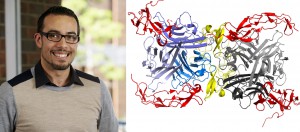
Left: Dr Mark Agostino. Right: The TNFSF14 protein (in grey, blue and violet) bound to its receptor (in red and yellow).
Early Career Research Fellow Dr Mark Agostino is among a group of researchers who may be on the cusp of finding a new way to treat two diseases that commonly occur in older age – obesity and Type 2 diabetes.
Mark is collaborating in a study led by Assistant Professor Vance Matthews, from the Royal Perth Hospital Medical Research Foundation, which is yielding promising results.
Funded by Diabetes Research WA, the study is looking at derivatives of the protein TNFSF14 may be used in the early or pre-diabetic stages to avoid or limit the development of Type 2 diabetes.
Pre-clinical testing has found the protein plays a key role in reducing weight gain, increasing glucose tolerance and reducing insulin resistance.
As a computational structural biologist, Mark’s research uses computers to investigate the structural basis of interactions between biological molecules and to guide drug design.
Mark’s role in this project is to design peptides that mimic TNFSF14 for potential use as therapeutics.
“So far, we have demonstrated that a short peptide within the TNFSF14 protein can increase insulin signalling in vitro,” Mark said. “From here, we will optimise this peptide using computational approaches to identify molecules with improved binding and drug-like properties. We will also be working closely with Dr Susan Northfield at the University of Melbourne, an expert in peptide synthesis, to make sure our designs can be chemically synthesised.”
The image on the above right shows the TNFSF14 protein (in grey, blue and violet) bound to its receptor (in red and yellow).
Mark says the findings may have wider relevance to CHIRI’s research, focused on adult diseases.
“In addition to diabetes, TNFSF14 and its interactions may be of interest to treat muscle wasting, also associated with ageing,” he said.
The research recently featured in The West Australian. You can read the article at https://buff.ly/2vRvmz0.